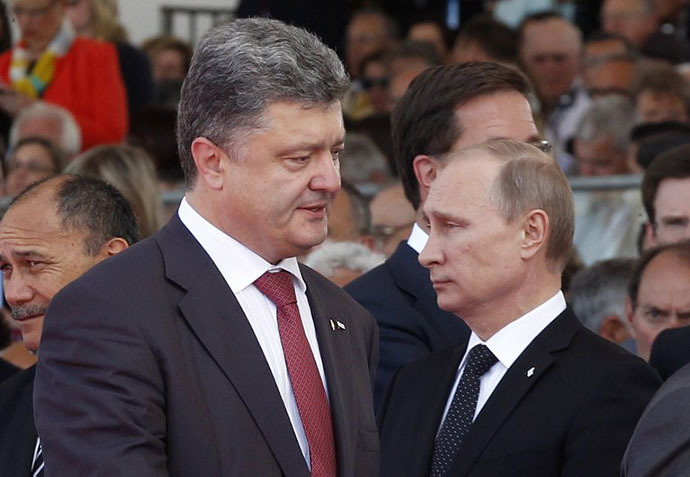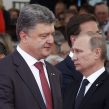
Minsk Ceasefire Agreements Are Dead, but the Russian Offensive Is Faltering
Publication: Eurasia Daily Monitor Volume: 12 Issue: 18
By:

The Minsk ceasefire agreements, signed last September by the representatives of Russia, Ukraine, the Moscow-backed rebels and the Organization for Security and Cooperation in Europe (OSCE), were designed to stop the fighting in the Donbas region of eastern Ukraine and create a semblance of a demilitarized zone from which the warring sides must withdraw their heavy weapons. But the Minsk agreements were never really implemented: The ceasefire was always shaky at best, the withdrawal of heavy weapons never happened, and control of the border with Russia was never handed back to the Ukrainian authorities or the OSCE. Munitions, heavy weapons and “volunteer” fighters continued to pour into Donbas from Russia. The rebel chieftains never seemed interested in implementing the Minsk accords, which left them in control of only some 40 percent of the territory of Donbas, in the role of some provisional local self-ruling authority. The rebels wanted to “liberate” all of Donbas (which encompasses the Luhansk and Donetsk provinces) and maybe move further to Odesa, Kharkiv and Kyiv. In the Supreme Rada (parliamentary) elections last October, the bloc of President Petro Poroshenko, whom Moscow considers a possible pragmatic interlocutor that might steer Ukraine back into the Russian sphere of influence, came only second in the popular vote; while the pro-European People’s Front of Prime Minister Arseniy Yatsenyuk, branded by Russian officials as the “party of war,” came first (see EDM, January 22).
A coalition government in Kyiv, led by Yatsenyuk, has denounced Ukraine’s nonaligned status and pledged European and Transatlantic integration, angering Moscow. According to Foreign Minister Sergei Lavrov, “only a nonaligned Ukraine may escape further territorial disintegration.” Lavrov accused the North Atlantic Treaty Organization (NATO) of being a confrontational relic of the Cold War and of moving forces up to Russia’s borders (TASS, January 28). Last November, the rebels swiftly organized unauthorized elections in their part of Donbas. Kyiv denounced the elections and accused Moscow of deliberately sabotaging the Minsk agreements (Interfax, November 4). The implementation of the Minsk agreements has been deadlocked and, apparently, the preparations of a Russian-backed military offensive has begun, requiring time-consuming efforts to rearm and reorganize the rebel forces, as well as build up their manpower and reserves of weapons and munitions.
Last week, in a short public statement before a closed meeting of the Russian Security Council, President Vladimir Putin announced that, on January 15, he sent Poroshenko a letter “offering to withdraw all heavy weapons away from settlements [including Donetsk city],” in accordance with the Minsk agreements, but “the Kyiv authorities” ignored it, attacking the rebels instead. Putin accused “official Kyiv” of only talking about peace, while, instead, instigating more fighting and “issuing criminal orders” (Kremlin.ru, January 23). In its substance, Putin’s letter was an ultimatum, intended as a casus belly: The rebels began a major offensive almost immediately to retake the Donetsk international airport on January 15, followed by major attacks on other parts of the front. After heavy fighting, the rebels pushed the Ukrainian military out of the airport, the scene of bloody pitched battles since last May (see EDM, January 22).
Apparently overwhelmed by offensive euphoria, a rebel military official spokesman, the chief of the defense ministry political directorate of the self-proclaimed Donetsk People’s Republic, Eduard Basuryn, told journalists: “The Minsk accords may be considered dead, what was signed is already invalid. Maybe some other format could be later renegotiated” (Interfax, January 28). This statement goes against the official rhetoric of the Russian foreign ministry and makes Russia’s friends in Western Europe look foolish while they were working hard to find some negotiated compromise, using the Minsk agreements as a foundation. A top European diplomat, deeply involved in those efforts, angrily told Jamestown he does not understand: “Was Putin pulling our nose all along?” Interfax, apparently under orders from an outraged Kremlin, pulled Basuryn’s statement off its site—the webpage is now reported as missing. But the report was already circulated verbatim by other official Russian news organizations, like the MIR24 TV channel (Mir24.tv, January 28).
This week (January 26), speaking in St. Petersburg, the Russian president accused Kyiv of using the Minsk ceasefire “only to regroup and resume attacks.” Putin branded the Ukrainian military “a NATO foreign legion” or mercenary force, fighting to “achieve the geostrategic goal of containing Russia, which does not coincide absolutely with Ukrainian national interests.” Putin continued by offering refuge on Russian territory to Ukrainian men called up for military service, if they dodge the draft (Kremlin.ru, January 26). Putin has branded the Ukrainian military an enemy of both Russia and the Ukrainian people. According to him, Ukraine’s Armed Forces must be defeated and cleansed from the land—which, incidentally, does not leave much room for the mutual full implementation of the Minsk accords. Putin’s press secretary Dmitry Peskov (an influential and well-informed Kremlin insider) told journalists: “The West wants to strangle Russia economically, isolate and overthrow Putin. The West will never stop trying” (Aif.ru, January 21).
The rebel offensive has caused much bloodshed, but the Ukrainian military is still mostly holding its ground, and the coalition government in Kyiv has not collapsed. Russia is not using its formidable air force; thus, the action on the ground somewhat resembles World War I encounters, with the battlefields dominated by artillery—although with the addition of multiple launch rocket systems (MRLS), mostly Grads. If Poroshenko had heeded Putin’s demand and withdrawn his heavy guns, the Ukrainian forces would have most likely been routed already. But with its gun positions still intact, the Ukrainian military has managed to regrouped, resupply and reinforce the frontline troops. Ukrainian counter-attacks have stabilized the front near the Donetsk airport. At present, the bloodiest fighting rages around Debaltsevo, where the Russia-led rebels are attempting to surround and capture the Ukrainian garrison. A defeat there could break Ukrainian morale, allowing the rebels to push on to capture all of Donbas and possibly cause a crisis in Kyiv that could topple the government (Mk.ru, January 28).
The present fighting has generally been transformed into an immobile war of attrition, and the rebel offensive may soon fully run out of steam. A resupply pause would be required by both sides, during which some semblance of a ceasefire could be reestablished. Or Putin could go all in—sending tens of thousands of additional regular troops into battle and beginning a major, all-out air offensive to decisively rout Ukrainian resistance. The odds for this or that outcome seem close to even.




